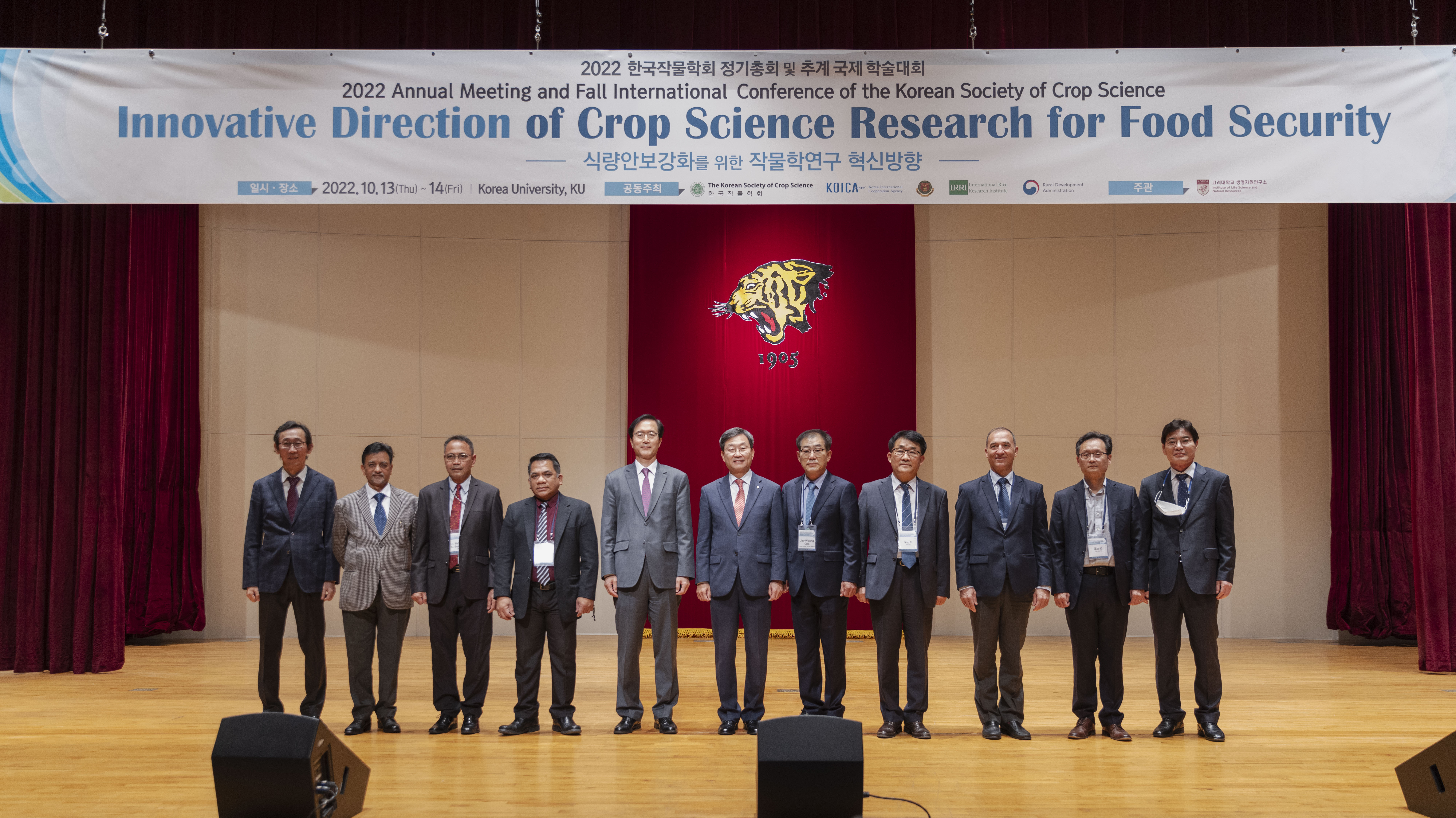International crop science conference tackled how to innovate to offer solutions for food security under climate change impact

(SEOUL, South Korea, 18 October 2022) – Innovation in crop science research became front and center in the international event organized to mark the 60th anniversary of the Korea Society of Crop Science (KSCS). KSCS, the Korea International Cooperation Agency (KOICA), the University of the Philippines Los Baños (UPLB), the International Rice Research Institute (IRRI), the Rural Development Administration of Korea (RDA) and the Korea University held the International Crop Science Conference titled “Innovative Direction of Crop Science Research for Food Security” at Korea University from 13 October to 14 October 2022.
Over 400 participants from Africa, Asia, Australia, Europe and North America attended the two-day conference and explored the themes of innovative genomics research on staple crops such as rice.
In his welcome remarks, KOICA Vice President Yun-Young Lee congratulated KSCS’s 60th anniversary, being at the forefront of crop science research, and encouraged international cooperation on innovative agriculture for global food security. “It is necessary to pursue comprehensive and integrated approaches to deal with the global food crisis caused by climate change, wars or pandemic. For the SDGs and global value achievement, the Korean government has increased the official development assistance (ODA) aid. In order to implement the ODA operations, KOICA funds USD 60 million per year to the agriculture and fisheries programs, which aim a) inclusive and sustainable rural development; b) promoting agriculture fishing industry and its value chain; and c) climate change resilient agriculture and fisheries production system as well as conservation of natural resources,'' said Vice President Lee.

“IRRI, for years, has been working with the government of Korea to find innovative ways to strengthen the country's rice sector. This partnership, which catalyzed the use of technologies like rapid multiplication of seeds and the exchanging of rice genetic materials for large-scale planting in Korea, is now making waves in building the capacity of young and upcoming agricultural scientists and researchers here and abroad. We are happy to have been working closely with KSCS, KOICA, the RDA and UPLB in this initiative, and we are beyond thrilled to be part of this conference, which is a great opportunity to take new and bigger steps to accelerate and scale innovations in agricultural research for impact on health, food and nutrition security, as well as economic, social, and environmental security” said IRRI Director General Jean Balié.
“The challenges of worsening climate change and the looming global food crisis are daunting. A united and multidisciplinary approach focusing on innovative agricultural research and technology will be necessary to face and resolve these challenges. UPLB is happy and proud to collaborate with our counterparts in the Korean academe on this front,” said Chancellor Jose V. Camacho of the University of the Philippines Los Baños.
During the first plenary session, Dr. Ajay Kohli, Deputy Director General for Research gave a talk about the role of international agricultural research institutes in particular OneCGIAR for global food security and future perspectives. Despite the challenges of climate change, political unrest, and global health issues, the integrative research paradigm led by IRRI, with a strong partnership with Korea and NARES partners, enables them to secure global food security.
A special session was dedicated to agricultural genetics research under the KOICA-UPLB-IRRI partnership* through the Korea ODA. This session addressed advanced bioinformatics, genomics, proteomics and transcriptomics research and tackled how the partnership can help in developing a strategy to address the current challenges of agriculture in the Philippines. This cooperative project includes the establishment of the advanced agricultural genomics center at UPLB, PhD programs at hub-universities in Korea, and MSc programs and internships at IRRI to research genomics and OMICs in plant, animal, insect and microorganisms species.
During the conference, IRRI and RDA led the meeting of the Temperate Rice Research Consortium (TRRC), a research network that recognizes the need for a “consortium approach” to help solve issues on temperate rice improvement including biotic and abiotic stresses, yield potential, and nutrition.
The organizers of the conference recognize that food security is a multidimensional challenge that entails transformation in the entire agri-food systems. Innovation in agriculture and crop science cuts across all the stages of the food value chains. Events such as this serve as incubators as well as accelerators, ideas, and alternatives approaches that can help countries to secure food security under climate change impact at the same time aim for sustainable development. This conference bolstered the existing collaboration between the Philippines and South Korea especially in the field of agricultural research.